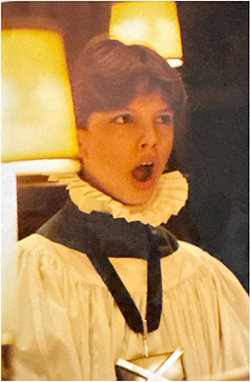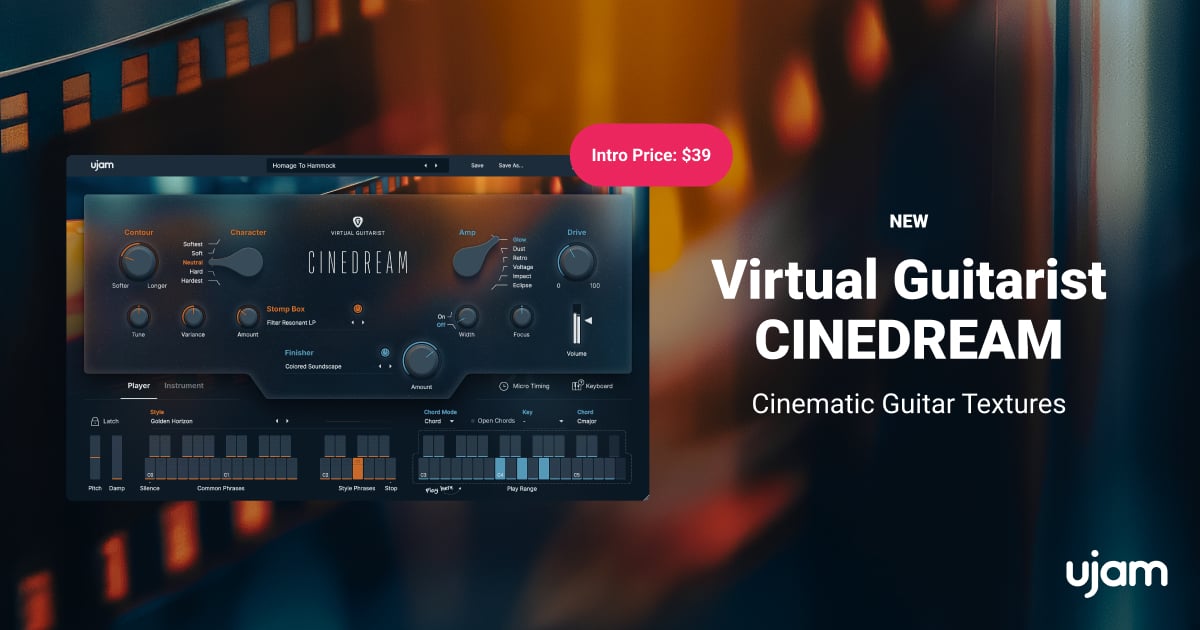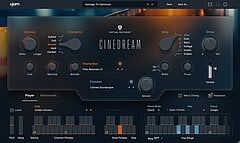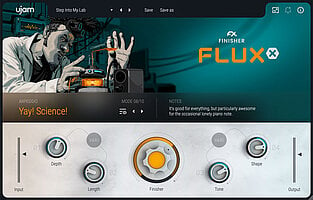David Buckley: Risk, Reinvention, Making Music That Matters—and a Whole Lot of Chaos in Between
From Choir Boy to Jason Bourne Composer (Without Losing His Mind)
MAY 23RD, 2025
David Buckley is an Emmy-nominated, genre-elastic British composer whose sonic fingerprints propel everything from Jason Bourne car-chase adrenaline (Jason Bourne) and Ben Affleck’s heists (The Town) to Neil Gaiman’s dream-realm in Netflix’s The Sandman, with detours through blockbuster mayhem (Greenland, Angel Has Fallen) and prestige TV (The Good Wife, The Lincoln Lawyer).
At UJAM, we love composers who kick down industry doors, laugh at “best practices,” and do their best work on a laptop balanced between coffee and chaos. David Buckley fits the bill. After years in the L.A. pressure cooker, he bailed in 2019, trimmed his rig to two Mac Studios, and now composes everything from operas to orchestral mayhem in a quiet UK town where no one gives a damn what he does. Buckley hopped on meeting with us between orchestra dates and school-run duties; below is the good stuff—stitched together so you can binge-read it in the time it takes him to bounce stems for London and L.A.

A Choirboy with a MIDI Controller
"Those formative years never leave you," Buckley insists. "They seep out unexpectedly, providing unique textures and colours even in the most modern contexts."
Let’s rewind. Before scoring CIA takedowns and Batcave brooding sessions, David Buckley was a Cambridge choirboy. Yeah — robes, hymns, the whole sacred shebang. But don’t let the angelic beginnings fool you. Behind that classical training was a guy who’d grow up to write music for corrupt cops, rogue agents, and digital anarchists.
His break? He got called by Harry Gregson-Williams having first met when they sang together in a UK cathedral choir: “Do you want to work on Flushed Away and Shrek 3?”
David said yes, moved to L.A., and boom — green ogres to gritty thrillers, no questions asked.
Hollywood, But Keep the Accent
Since landing in the States, Buckley’s built a résumé that reads like a streaming junkie’s watchlist: The Good Wife, The Lincoln Lawyer, Nobody, Papillon, The Town, Angel Has Fallen, The Stranger, Kandahar, The Sandman
He’s worked with Ridley Scott, Taykor Hackford, Ben Affleck — basically, if your script has guns, secrets, or moral ambiguity, David’s your guy.
He doesn’t chase trends, he chases tone. And he’s got that rare ability to write music that doesn’t just support a scene — it sells it.
But the UK-based composer doesn’t lean on his past hits. Instead, Buckley approaches each project by asking one critical question:
"What’s the one thing this project truly needs that isn’t currently on-screen and that only I can provide?”
But life moves fast and since bailing on LA in 2019, he writes from a “tiny British city where everyone is indifferent to what I do,” sending Pro Tools stems across the Atlantic while the kids raid the biscuit tin.
"LA felt like everything was always 'on', and it drained me," Buckley admits. "In the UK, I step outside the studio, and no one cares what I do—it's freeing."
Genre Hopping Without a Seatbelt
Jason Bourne, The Nice Guys, Nobody, Papillon, The Good Wife/The Good Fight, and now The Sandman. When a new gig lands, Buckley’s first move isn’t a chord—it’s a chat:
“Composers normally show up late to the party, so our first job is to catch up on what others might have been working on for months if not years. So I hunt and gather and figure out what’s missing? What can I add that isn’t on‑screen yet? Sometimes that’s a whisper; sometimes it’s a 60‑piece orchestra.”
Buckley’s roots are steeped in choral music, an influence he still taps into, even when diving into electronic-heavy scores. He recounts his approach on the Greenland sequel, where instead of repeating the organic choral style of the first film, he recorded one single soprano, then dropped her four octaves, mangled the formants, and panned it like a drunk UFO.
Result: post‑apocalyptic angel dust that still feels human—organic yet alien, familiar yet distorted.
From Remote Control to Taking Control
Having rented a studio at Hans Zimmer's Remote Control Productions, Buckley learned valuable wisdom from the other composers around him—not so much about music composition itself but about managing creative relationships and navigating industry hurdles.
"Having had a glimpse at how Hans operates taught me about problem-solving, and how to manage crises gracefully," Buckley says. "It's those soft skills that often determine whether people break through or burn out."
Lessons from front‑row seats to A‑list crisis management:
- Charisma trumps chords. “Hans can calm a room faster than I can open a session.”
- Find the USP. Imitating another composer’s style is probably not going to get you very far. If you are going to take anything from Hans, steal his appetite for risk taking.
- Every gig is at least 50 % politics. It’s a given that you can write music, but can you sell it? Can you keep executives calm who are nervous about their projects? Can you cope with creative disagreements and steady the ship over troubled waters? These skills are hard to teach but are just as valuable as being able to write.
Technology: Friend, Not Foe
"The fact I can score an entire film on a Mac Studio blows my mind," he says, highlighting tools like UJAM’s Virtual Guitarist as essential components of his workflow. "These plugins give immediate vibe and inspiration, essential when working under tight deadlines."
David recently downsized his entire setup. Out went the synths and external servers. In came a sleek, two-Mac-station workflow. Why? Speed and recall. TV deadlines wait for no one.
"I loved my analog gear, but it slowed me down. Now it’s all in the box, and honestly, the quality of plugins today? Insane. I just wrote an entire opera in one sequence with 400 orchestral tracks running and the tempo adjusting every other bar. Zero issues."
When it comes to plugins, he’s not a snob. "Some people say you should design and record every kick drum from scratch. Who has time for that? If Damon Albarn can use a Casio preset on a massive hit, so can I."
And yes, he's a longtime user of UJAM tools. From Jason Bourne to countless TV projects, Buckley often turns to plugins like Virtual Guitarist to lay down ideas quickly—sometimes even making it into the final mix alongside real players. "It's about getting a vibe fast. Sometimes that spark is all you need."
The Future is Bold (And a Little Terrifying)
As AI reshapes industries, Buckley sees both threat and opportunity. He predicts AI might replace certain jobs but remains optimistic about drama and film.
"AI can mimic formulas, but not genuine human emotion," Buckley argues. "This era demands that composers take bigger, bolder swings. Emulating your favorite film composer is not going to cut it - AI will do that cheaper."
Advice for Aspiring Composers: Embrace Your Weird
In a world spinning faster than ever, what's his advice to up-and-coming composers?
Buckley acknowledges the game is harder now. "Not everyone will make it. Maybe you need a plan B. I kept my plan B alive until I was 30 then things gradually began to shift to plan A. But if you're gonna go for it, go for it. Always try to bring your musical passions into your writing.
His main advice to newcomers: Take risks and embrace authenticity. "I think we will all have to take greater risks in order to stand out today," he says. "One meaningful, risky track will likey beat a hundred safe, forgettable cues."
He emphasizes staying curious—listen to music (all music not just film music), explore art, stay open-minded. "Absorb everything, keep what resonates, discard what doesn't," he advises. "Process these influences through your own emotions and create something only you could make."
Closing Cue
David Buckley’s career proves that innovation, authenticity, and a willingness to pivot matter far more than playing it safe. "We never stop learning," he says. "There's always another creative mountain to climb."
“It’s tempting to think there are quick shortcuts to success, and while courses and tutorials in media music can provide useful overviews, I think they can only get you so far. When the project allows, bring your musical passions to the foreground and take a risk - it will pay off in the long run”.
The Future of Cinematic Guitar Has Landed

Stay up to date
Sign up and we’ll send you an e-mail with product news and helpful stuff every now and then. You may unsubscribe at any time.
Defy Limits
We develop software solutions that enable people to create, consume and interact with music.




